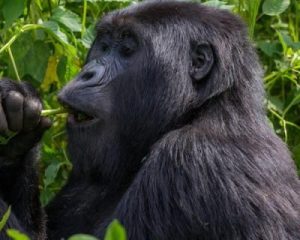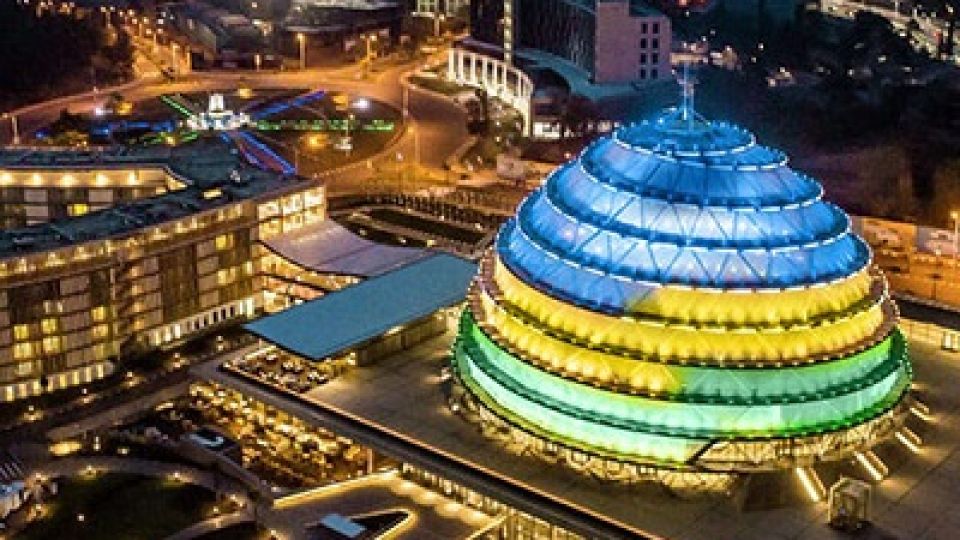from GEOFF HILL in London, UK
United Kingdom Bureau
LONDON, (CAJ News) – KIGALI is, for now, one of Africa’s safest cities. Walk down a street in the Rwandan capital after dark and there are lights everywhere, police are on the beat and tourists and locals are strolling back to their lodgings or dining al-fresco.
There are no potholes where you might twist your ankle and the city feels, and works, like a European capital, without the pickpockets. The power of the state here is absolute; few dare to test it.
Many travellers come to Rwanda to see mountain gorillas. As with Kigali, Rwanda’s national parks are safe and poachers risk being shot if they cross the fence. After decades in decline, gorilla numbers in Rwanda are on the increase. Rwanda is a country, to all appearances, that other African countries aspire to emulate.
There is no doubt that Rwanda is an impressive place to visit but this efficiency comes at a price: at the election in 2017, president Paul Kagame took an unconvincing 99 per cent of the vote. Most of the opposition are in exile, but like Singapore under the late Lee Kuan Yew, there is order and progress, corruption is low and the economy is booming.
Investors, unsurprisingly, love Rwanda. Joining them soon could be a mixed bag of migrants who got caught entering Britain illegally, if Rishi Sunak’s Rwanda bill – which will be voted on in the Commons tonight – gets off the ground.
Critics of this measure to ‘stop the boats’ usually focus on whether or not Rwanda is ‘safe’ for migrants. The Prime Minister insists it is, but in doing so he is ignoring one of the bloodiest conflicts in Africa that’s been raging for the past decade, just a three-hour drive west of the capital, on the border with the Democratic Republic of Congo (DRC).
On 20 December, Félix Tshisekedi (known locally as FT) was re-elected president of the Congo. In his campaign speeches, he promised to find jobs for the millions of youth who are out of work. He also brought one stadium after another to its feet with fiery rhetoric about Rwanda. ‘We will march on Kigali,’ he told his followers.
Kagame, he says, is arming and funding rebels, including the murderous M23 militia in an effort to seize land from the Congo. Kagame denies doing so. But after years of talks and peace efforts, the Congolese leader is running out of patience. ‘The DRC has changed and I will respond to any provocation,’ FT has told supporters.
In 1994, Paul Kagame and a band of fighters, mostly from his Tutsi tribe, led the insurgents who took control of Rwanda. In doing so, they ended the genocide in which an estimated 800,000 Tutsis were slaughtered by the majority Hutu. Kagame claims many of the killers escaped to the Congo from where, supported by Tshisekedi, he fears they are planning a comeback.
Both sides deny sponsoring any of the more than 100 guerrilla groups active in the region. But in October, the US cut off military aid to Rwanda because of its support for M23; UN experts have also pointed the finger at Kagame, saying they have ‘obtained solid evidence of the presence of, and military operations conducted by, RDF (Rwandan Defence Force) members in Rutshuru (Congolese) territory’.
There’s a lot worth fighting for. Rwanda is not a big country: its size is comparable to the tiny mountain kingdom of Lesotho in southern Africa. But while Lesotho has a population of just 2.2 million, Kagame rules over around 14 million people. On the other side of Rwanda’s western border with the Congo — an area that, in pre-colonial times, belonged to Rwanda and where, thanks to the rebels, many of the locals have fled — there is not only vacant land but the world’s richest deposits of cobalt, vital to batteries used for renewable energy. Copper, gold and gemstones can also be found. FT has ruled out swapping land for peace; instead he compares Kagame with Hitler, vowing that ‘he will end the same way as Hitler.’
Millions across the region have been killed or rendered homeless, forming a vast number of ‘internal refugees’. There have been truces, including one during the recent election in Congo, but they don’t last for long.
In November, the UN’s special representative to Kinshasa, Bintou Keita, warned of ‘rising regional tensions between the DRC and Rwanda, increasing the risk of direct military confrontation’. Robert Wood, a delegate from the US State Department who attended her briefing said, ‘the speed at which Rwanda and the DRC approached the brink of war in recent weeks has been alarming.’ So alarming, in fact, that before Christmas, US secretary of state Antony Blinken was on the phone to both Tshisekedi and Kagame, and White House Director of National Intelligence, Avril Haines, flew to Kigali and Kinshasa in a bid to ‘de-escalate tension’.
DRC has over 130,000 troops in the field while Rwanda has an army of around 35,000, battle-hardened soldiers who are ready for action.
FT’s inauguration for his second and last five-year term under the constitution is this Saturday. While there’s no doubting his popularity, the election was chaotic. Opposition leader Moïse Katumbi, who came second with just 19 per cent, described it as a ‘fraud’ and said the courts are not impartial enough for a legal challenge to have any chance.
Monitors from the US Carter Centre also raised concerns: it said that some of the polling stations it visited only ‘opened hours after the scheduled start time’. At close to a fifth of polling stations inspected, monitors said ‘the conduct of voting was assessed negatively’, with ‘serious irregularities observed in several of them’.
But, in London, once the results were announced, Foreign Office minister Lord Benyon, gushed his congratulations. ‘The United Kingdom commends DRC voters for their participation,’ he said. ‘Voting was broadly peaceful and the election took place on time,’ and he advised those who lost and felt cheated to pursue their claims through ‘legal and constitutional channels’.
Seemingly turning a blind eye to Tshisekedi’s pledge to topple Kagame, Lord Benyon said the UK, ‘remains a committed partner,’ and ‘fully supports the president’s ambition to secure long term peace and prosperity for both DRC and the region.’
For Rishi Sunak’s government, there are two problems if a conflict does break out between Rwanda and DRC. First, the DRC has voted with the UK and Nato on contentious issues at the UN, notably including motions condemning Russia over Ukraine in which other African countries abstained and several, including Zimbabwe, Eritrea and Ethiopia, sided with Moscow. On a continent where both London and Washington are short of friends, they can bank on Félix Tshisekedi.
Second, acknowledging FT’s apparent intention to march on Kigali would scupper the plan for migrants to be sent there. Neither Sunak nor Home Secretary James Cleverly have brought this into the conversation. Although the Home Office says Rwanda is ‘safe’, it also concedes there are problems, ‘with its human rights record around political opposition to the current regime, dissent and free speech’.

A gorilla in Rwanda
Kagame will face his own election on 15 July. He has already scrapped the constitutional limit of two terms — this will be his fourth — and anyone coming back from exile would likely be in prison before they could register as a candidate.
One of the parties operating abroad is the Rwanda National Congress. Its secretary general, Etienne Mutabazi, holds a doctorate in law. When the UN set up its International Criminal Tribunal in Tanzania to judge those accused in the 1994 genocide, Mutabazi served as an investigator and legal officer to the court. Now an academic, he has been a consultant to the American Bar Association and lectures widely on conflict and human rights law. Speaking in Johannesburg, he said a Congolese invasion of Rwanda remained a risk.
‘For years now, this has been the most lethal war on the planet. More than five million have died in a conflict that has flared over and again. And much of the blame lies with president Kagame of Rwanda who the UN has repeatedly shown is backing the rebels.’
Mutabazi believes that, for his second and final term, Félix Tshisekedi will want to be remembered as the man who ended the bloodshed.
‘I hear the UK talking about how safe Rwanda is,’ Dr Mutabazi said, ‘but they speak as if it was an island in the Atlantic. The drive from the Congo border to Kigali is less than 160 miles, and within hours Tshisekedi’s troops could be in the capital. And what will Mr Sunak do then? Evacuate the people he sent there back to Britain?’
A senior defence attaché at an embassy in Kigali, who asked not to be named, said ‘a Congolese invasion of Rwanda is very possible, but it would not have the support of Britain, the US or the European Union, and could drag on for years,’ adding that Kagame’s forces were, ‘better armed, better trained and better paid’.
Tourists coming to see the gorillas remain, for now, none the wiser. With the media under state control, they will read in the local press of how Rwanda is a tiny patch of calm on a continent where chaos and uncertainty is the norm. The country works, the stores are full, peace has come and there is not a worry in sight – for now.
– CAJ News

